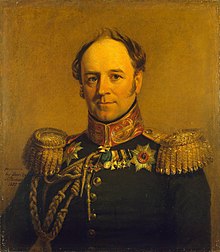Alexander von Benckendorff – Wikipedia
From Wikipedia, Liberade Libera.

Alexander von Benckendorff ( in Russian: Count Alexander Khristoforovich Benkendorf ? , Aleksandr Christoforovič Benkendorf; Reval, 4 July 1781-Keila-Joa, 5 October 1844) was a Russian general, general helper of the Tsar Alessandro I, commander of the units partisan (irregular Cossacks) during the war of 1812-13.
It is often remembered for his subsequent assignment, under the Tsar Nicola I, of Chief of the Political Police, the third section, and for creating the OTDDEL’NYJ Korpus žandarmov ( in Russian: A separate body of the gendarmes ? , Separate body of the gendarmes), a special gendarmerie at the service of the political police.

Alexander von Benckndorff was born in a German Baltic family in Reval (later renamed Tallinn, part of Estonia). His father was General Christoph von Benckndorff, military governor of Livonia, while his brother Konstantin von Benckndorff was general and diplomatic; Her sister Dorothea was part of the worldly life and politics of London and Paris. During the Napoleonic campaign of Russia, Benckndorff led the offensive Veliž, taking three French generals prisoners. When Moscow was freed, she became the commander of his garrisons. In the foreign military campaign that followed, he defeated a French contingent in Tempelberg, and was one of the first Russians to enter Berlin. He also distinguished himself in the battle of Leipzig, and later he shed the French who were occupying the Netherlands. After the British and Prussian forces arrived to take his place, his unity continued towards the conquest of Lovanio and Malines, freeing 600 British imprisoned along the road.

In 1821 he tried to alert Alexander I against the risk represented by the Decabrists, a clandestine organization, but the Tsar ignored his opinion. After the deduction of 1825, he chaired the Investigation Committee and organized the creation of bodies of gendarmes and a secret police, the third section of the imperial chancellery. He was the first head of the Gendarmi and executive director of the third section from 1826 to 1844. Under his guidance the third section introduced a iron censorship on literature and theater.
His judgment on Russia is summarized in his sentence that “the past of Russia was admirable, his present is more than magnificent and, as for his future, it goes beyond the most daring imagination”. [first] As head censorship he was involved in the destiny and tragic death of Aleksandr Sergeevič Puškin in a unnecessary duel, involvement that for a long time made him “not quoted” in Russian historiography.
Benkendorff suffered from the bizarre tendency to forget his name, and periodically he had to check it by reading it on his business card. [2] Since 1935, his family moved to a neo-Gothic manor to Schloss Fall (today Keila-Joa) near Tallinn, in today’s Estonia. [3]
A recent Russian publication has revealed new details of his youth: Benckndorf’s notes: the patriotic war; year 1813: the liberation of the Netherlands . [4] This book reproduces two sections of Benckndorff’s private notes, relating to Napoleonic wars, and correspondence with its contemporaries, Bagrazion and others.
According to this book Benkendorff held personal notes and diaries throughout his life. A further source for its notes, in this case just before 1840, is the volume 91 of the magazine The Journal of the Journal from 1903.
Russian honors [ change | Modifica Wikitesto ]
| Medal for xl years of impeccable service | |
Foreign honors [ change | Modifica Wikitesto ]
- Ronald Hingley, The Russian Secret Police: Muscovite, Imperial, and Soviet Political Security Operations (Simon & Schuster, New York, 1970). ISBN 0-671-20886-1
- R. J. Stove, The Unsleeping Eye: Secret Police and Their Victims (Encounter Books, San Francisco, 2003). ISBN 1-893554-66-X
- Judith Lissauer Cromwell, “Dorothea Lieven: A Russian Princess in London and Paris” (McFarland and Co., 2007) ISBN 0-7864-2651-9
Recent Comments